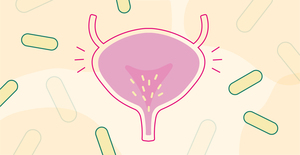Key points
- Gastroenteritis, or "stomach flu", is common in children and can lead to serious dehydration.
- The condition is usually caused by viruses like rotavirus, norovirus, and astrovirus, especially in winter months.
- Symptoms include loss of appetite, bloating, nausea, vomiting, abdominal cramps, and diarrhea.
- Treatment involves hydration, bland diet, monitoring for severe dehydration, and in some cases, antiemetic medications.
- If symptoms persist or signs of severe dehydration occur, medical help should be sought. Urgent care clinics can provide treatments like antiemetic medication and IV fluids.

Gastroenteritis, commonly known as the “stomach bug” or "stomach flu", is a common and sometimes uncomfortable experience for children, explains the American Academy of Family Physicians (AAFP).
One of the main concerns with gastroenteritis in children is the risk of dehydration, which can be particularly serious for young children and babies. It's important for parents and caregivers to monitor their child's fluid intake and seek medical attention if they notice signs of dehydration.
Continue reading to learn more about what causes gastroenteritis, symptoms, and how to manage symptoms.
What Is Gastroenteritis?
Gastroenteritis is the medical term for what we know as “the stomach bug”, "the stomach flu", or “the vomiting bug”. Essentially, it is an inflammation of the stomach and intestines. It can lead to symptoms like upset stomach, vomiting, and diarrhea.
Gastroenteritis can be caused by several things, but the most common reason for children is a virus, according to the Merck Manuals. Viruses like rotavirus, norovirus, and astrovirus circulate all year long but tend to rise in the winter months. This is usually because people tend to gather inside more during colder months, which can expose more people to more germs.
Staying hydrated is the best and most important treatment, recommends the AAFP. However, sometimes severe dehydration warrants a trip to urgent care.
What Causes of Gastroenteritis in Children?
In children, viral gastroenteritis is caused by a viral infection — with viruses such as norovirus, rotavirus, and adenovirus being frequent culprits, according to the AAFP. In some cases, strep throat can also cause gastroenteritis symptoms. They also note that bacterial causes may include Escherichia coli, Salmonella, or Campylobacter.
Having close contact with an infected person is the most common way in which the infection spreads, according to the AAFP. This can happen if you share food or drink, kiss, share personal items, or come in contact with the vomit or feces of an infected person.
Touching a contaminated surface can also expose you to a virus that can cause gastroenteritis (like rotavirus, norovirus, or astrovirus). These viruses can live on surfaces for several hours, according to the AAFP. For children, who often explore with their hands and put objects in their mouths, picking up the stomach bug can be very easy.
Viruses that commonly cause gastroenteritis are not easily killed with hand sanitizer, so it is important to wash your hands with soap and water frequently during stomach flu season or if you are around anyone who has symptoms of the stomach bug.
Symptoms of Gastroenteritis
Viral gastroenteritis can lead to several symptoms that can range from mild to severe. Viral gastroenteritis may also be accompanied by dehydration, especially in young children and babies — for this reason, it's important to monitor for signs of severe dehydration and get medical attention if needed.
The Mayo Clinic lists the common signs of viral gastroenteritis in children as:
- Loss of appetite
- Bloating
- Nausea
- Vomiting
- Abdominal cramps
- Abdominal pain
- Diarrhea
How Is Gastroenteritis Treated?
Gastroenteritis is typically managed with supportive care — aimed at relieving symptoms and preventing dehydration, according to the AAFP. For children, this supportive care may include:
- Oral rehydration solutions to replace lost fluids and electrolytes
- A bland diet to ease gastrointestinal discomfort
- Monitoring for symptoms of severe dehydration
The Merck Manuals notes that you should continue offering fluids to babies and children, even if it causes more vomiting and diarrhea. They recommend:
- Offering babies a drink every time they vomit.
- Give older children a drink (150–200ml) after every big vomit or bout of diarrhea.
- Give small amounts of fluids often if your child is vomiting a lot (a mouthful every 15 minutes).
In some cases, it may be necessary to see a healthcare provider. If vomiting symptoms persist for several hours, a healthcare provider may prescribe antiemetic medications to help control vomiting. These antiemetic medications can be given by IV, or with a dissolvable tablet under the tongue, or suppository, according to the AAFP. Antiemetics work by reducing intestinal inflammation, which can then reduce nausea, vomiting, and diarrhea. This may be given along with fluids when treating dehydration.
How Can I Prevent Gastroenteritis?
Preventing gastroenteritis involves taking steps to avoid being exposed to the viruses and bacteria that can cause gastroenteritis, according to the AAFP. Viruses like rotavirus and norovirus often spread quickly in areas where many people gather—including schools. This includes:
- Practicing good hygiene, such as frequent handwashing with soap and water—particularly before handling food and after using the bathroom. Hand sanitizer is not enough to kill certain stomach bug viruses (like rotavirus, norovirus, and astrovirus). Washing your hands with soap and water is the best way to kill germs that you may have touched.
- Ensure that food is prepared and stored properly to prevent contamination.
- Avoid close contact with individuals who are sick with acute gastroenteritis symptoms
- Only drink from water sources that are clean and safe
- Clean toys regularly, especially if they are played with by multiple children or after a sick child has played with them
- Disinfect toys and surfaces, especially during stomach flu season.
- Get your child's recommended rotavirus vaccine
In some cases, vaccines are available to protect against specific causes of gastroenteritis, such as the rotavirus vaccine for young children. The rotavirus vaccine is currently recommended by the CDC for all children who are able to get it. This is because rotavirus can cause severe symptoms in young children, which then can lead to severe dehydration and even hospitalization. Usually, a blood test or stool test is needed to diagnose norovirus or rotavirus, but your healthcare provider may make the diagnosis based on symptoms alone, according to the Merck Manuals.
When Should I Call the Doctor?
When dealing with the stomach flu, children can become dehydrated very quickly because they are so much smaller than adults. the Merck Manuals notes that you should seek medical attention for your child if your child experiences any of the following symptoms:
- Have several episodes of vomiting or diarrhea
- Are not drinking or keeping liquids down
- Show any signs of severe dehydration, such as dry mouth, fewer wet diapers, sunken eyes, or crying with no tears
- Have blood in their diarrhea or vomit
- Have significant abdominal pain
- Have vomiting that lasts longer than three days
- Have diarrhea that lasts longer than 10 days
Signs Of Dehydration
Dehydration is a serious condition, especially for young children. Dehydration can occur when you are vomiting frequently and not able to keep fluids down—so watching for signs of dehydration is very important. According to KidsHealth.org, the signs of dehydration in young children include:
- Few or no tears when crying
- Eyes that look sunken
- Soft spot (fontanelle) on the top of the head looks sunken (for infants under one year)
- Fewer wet diapers than usual
- Red coloring in their diaper
- Crankiness and lethargy
- Drowsiness
Pediatric Urgent Care Near Me
In many cases, going to an urgent care clinic can help if you or your child is suffering from prolonged vomiting or showing signs of severe dehydration. Urgent care can often provide treatments like antiemetic medication and IV fluids for treating dehydration.
FAQs
What is gastroenteritis?
Gastroenteritis, also known as the "stomach flu", is an inflammation of the stomach and intestines that can cause symptoms like upset stomach, vomiting, and diarrhea.
What causes gastroenteritis in children?
Gastroenteritis in children is most commonly caused by viruses such as norovirus, rotavirus, and adenovirus. It can also be caused by bacteria like Escherichia coli, Salmonella, or Campylobacter.
What are the symptoms of gastroenteritis in children?
Symptoms of gastroenteritis in children can include loss of appetite, bloating, nausea, vomiting, abdominal cramps, and diarrhea.
How is gastroenteritis treated in children?
Gastroenteritis in children is typically treated with supportive care aimed at relieving symptoms and preventing dehydration. This may include oral rehydration solutions, a bland diet, and monitoring for symptoms of severe dehydration.
How can gastroenteritis be prevented in children?
Gastroenteritis can be prevented by practicing good hygiene, ensuring food is prepared and stored properly, avoiding close contact with individuals who are sick, drinking from clean and safe water sources, cleaning toys regularly, disinfecting surfaces, and getting the recommended rotavirus vaccine for children.









